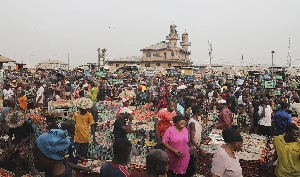On a busy Monday morning, amid heavy traffic, Simisola, a sales girl at a supermarket in Ilupeju, Lagos, joined others to trek some distance to work. ...READ THE FULL STORY FROM SOURCE ↔️
They trekked from Canoe Bus Stop at Oke-Afa to Ajao Estate in Isolo to connect Oshodi before boarding a commuter bus, just to save on transport and manage their meager earnings.
1.2.2. SEE. VIDEO: MAN. KILLED. MOTHER. FOR .RITUALS
Considering the almost 100 percent hike in transport fare by commuter buses in response to the recent increment in fuel pump price, many are hitting the road on foot like Simisola.
In the wake of the new price increment, many motorists have packed their cars at home to join commuter buses, considering that it is economical to do so as fuel is very expensive now, and most regrettably, scarce.
“It has been difficult to go to work since fuel was increased to N850 per litre. I used to spend between N1500 to N2000 on transportation every day, but I spend double that amount now and my salary is far below N100,000 a month. I am just working for nothing now,” she said.
Obviously, many Nigerians are experiencing difficulties due to the incessant hike in the prices of everything in the country, especially since the beginning of the current administration.
Now, many are paying far more for less units of electricity; far more for less litres of fuel and sadly, far more for less food items.
As the hardship persists, it makes life unbearable for many Nigerians, with many fearing that the air they breathe might not be free soon.
But, having been pushed to the wall, many Nigerians, like Simisola, are now adopting a swim or sink approach as they must survive in spite of the government’s harsh policies.
Akeem Olabode, a laboratory assistant with a private hospital in Lekki Phase 1, Lagos, lamented that the austerity measures, which his father spoke about during the military regime, is back because many cannot survive the high-level inflation in the country, which the recent fuel pump price has worsened, without being frugal in their expenditure.
“Since last week, I have been seeing more people trek some distance to work and to their businesses, even if it is from one bus stop to another, just to save money. If you check, the streets and highways are busier now in the morning and evening when people go and return from work, despite the risk. There is no money, nobody is increasing salaries and even the minimum wage makes no sense again because of the hike in fuel price,” Olabode observed.
The laboratory assistant, who warned that long distance trekking is not good for health, lamented that more people are not coming to hospitals again because of the high cost of healthcare, which he noted would worsen as the economy bites harder and would result in more deaths from ailments that could have been prevented or treated if the cost of accessing healthcare was cheaper.
Part of the survival measures, especially for some workers in Lagos and Abuja, who cannot bear the high cost of transportation, is to stay back in their working places and return home on weekends, while some companies run extended shifts to help junior staff members to save money on the days they are off duty.
“Some of our accounts and IT staff members are staying back in the office nowadays, they claim that there is more work load now, but I know that some of them don’t have money to shuttle every day from Lugbe, Nyanya, Gwagwalada and even as far as Suleja to come to work every day.
“I live near the University of Abuja and I go home only on weekends to save money for family upkeep, school fees and house rent,” an Abuja resident, who simply introduced himself as Ikiri, said.
According to Ndubisi Uchegbu, a civil engineer and CEO of a medium-sized construction company in Aba, Abia State, the country is in survival mode now and that is the only way to go.
“I have told my children who did not experience the structural adjustment programme (SAP) under the military regime that the season of lack is back and we have to weather the storm again by responding accordingly.
“I cannot buy the very high dollars, so foreign universities are out of it, I cannot afford a new car, so we have to maintain and manage our Toyota Highlander 2009 model, we have started attending a closer branch of our church, and my children’s pocket money is half now because food money has far increased,” Uchegbu explained.
Looking at the sad state of the economy, the civil engineer regretted that Nigeria was back to her ugly past for failing to build in the days of plenty and the people have no option than to sadly adjust to the reality of the time.
“One of my friends withdrew two of his children from private to public universities because he can no longer afford almost N5 million tuition fees.
“One of my tenants, who has two cars, sold his SUV last February because of the high cost of everything; from fuel, oil, spare parts, licence and document renewals.
“Again, having a fleet of cars, whether they are exotic or not, invites kidnappers here in Aba.
“Moderate lifestyle is the way to go now or you sink because the economy and this government are not smiling,” he noted.
To survive the hardship, in Port Harcourt, many are moving to areas, especially suburbs where house rent is cheaper.
According to Tega Ovie, a science teacher in a private school in GRA Port Harcourt, many are moving to Obigbo, Aluu, Choba, waterside and other suburbs where rent is cheaper.
“No matter how frugal you are, you cannot run away from spending in today’s Nigeria. Port Harcourt has one of the highest house rents in Nigeria, but those who run away from the city to suburbs because of high rent, end up paying heavily on transportation to the city where the work is.
“The best would have been for your place of work to be closer to your house, but you cannot determine that unless you are an employer,” Ovie said.
In Lagos, many are leaving semi-highbrow areas like Surulere, Ilupeju and some parts of Ikeja further down to suburbs where rent is cheaper.
“When someone says he lives in Lekki or Ajah, ask very well because landlords have used exorbitant house rents (some even in dollars) to push many far from the city. Some live in places that are as far as 50 kilometers from Lekki Phase 1 because they cannot afford rent inside the real Lekki.
“The reality is that people who cannot afford these highbrow areas are no longer pretending again, if they do, the economy will embarrass them. Many are now living where they can afford even if it is a one-bedroom apartment or an uncompleted building,” Nike Adeoye, a banker, said.
Apart from the high rent, the high tuition fees by private schools in the highbrow areas in Lagos, high maintenance and security levies paid by residents in gated estates, are part of the reasons many who cannot afford the good, but expensive lifestyle, are moving to the suburbs.
“To be realistic, most of the exorbitant Ikoyi and Lekki house rents are being paid by companies for their senior staff members, and when they are out of those jobs, they find it difficult to pay, many move to neighbours with cheaper rent. It is all about adjustment and survival and many are fast adjusting to the economic reality today,” Adeoye said.
Chijioke Umelahi, a former Abia lawmaker and an Abuja-based lawyer, disclosed that everyone, including the rich, are adopting cost-saving measures now.
“I have curtailed my travels and have resorted to video calls for some issues that require my presence outside Abuja. I have reduced my fleet of cars from four to just two because of the cost of fuel, maintenance and renewal of vehicle particulars now.
“Food is relatively cheap in Abuja, but every other thing is expensive now, so I stay more at home now and only move out when it is business or church on Sundays,” the lawyer said.
To beat the hardship, some families now make out time to buy things in bulk from wholesalers in major markets.
“This time requires buying right and supermarkets and street vendors are out of it. It is always cheaper to buy in bulk. So, I go to Lagos Trade Fair or Idumota market to buy provisions and save a lot,” Lucy Onoh explained.
However, Titi Omilani, a public servant and mother of three, goes for what her money can afford.
“I know that bulk purchasing saves money, but I am a salary earner, so the only way to beat the hardship is to buy what I can afford. If I cannot buy a family size, I go for medium. It is simply cutting my coat according to my size,” she said.
Omilani has also resorted to doing things around her neighbourhood to save cost. “My last child attends a school nearby without using school bus, I worship at a nearby church, which is a walking distance, my hairdresser and mechanic are around my neighbourhood, the market is within. So, I try as much as I can to stay within and it saves me from unnecessary expenses and ensure safety too,” she disclosed.
From increasing their sources of income, being frugal and innovative, change of lifestyle to other cost-saving measures, Nigerians seem to be taking their lives into their own hands and are determined to survive in spite of the economic hardship.
1.3.4. POPULAR. ACTRESS. SECRET. VIDEO. LEAKED. OUT. GOES VIRAL
But many concerned citizens wonder how far the people can continue to stay afloat as the economic hardship worsen daily and the government does little to address it.▶For More READ THE FULL STORY▶▶




